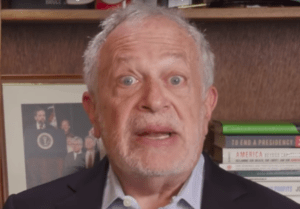What Happened to Jeffrey Epstein?
The only way to get to the bottom of this increasingly sordid story is for Congress to investigate, argues The Nation's Jeet Heer. Jeffrey Epstein (New York State Sex Offender Registry / AP)
Jeffrey Epstein (New York State Sex Offender Registry / AP)
What follows is a conversation between The Nation’s Jeet Heer and Sharmini Peries of The Real News Network. Read a transcript of their conversation below or watch the video at the bottom of the post.
MARC STEINER: Welcome to The Real News Network. I’m Marc Steiner. Great to have you all with us.
Jeffrey Epstein was found dead, as you all know, of an apparent suicide. Apparent means that there are a lot of unanswered questions. But so much of the media and public discourse seems to be bouncing between #trumpbodycount and #clintonbodycount. All these conspiracy theories abound, but what do they do for us? Where do they really take us? There are questions to be answered, for sure, like why was he left alone? What was the shrieking before he was found in his cell? Why didn’t Acosta prosecute him in the first place? What do we make of the alleged murky ties to law enforcement and intelligence communities? How do his ties with the rich and powerful play into all of this, and I mean all of it?
Well, on our quest to find out that, we will talk to our guest. Jeet Heer is the National Affairs Correspondent for The Nation and the article he wrote was “Epstein’s Death Demands Investigation, Not Conspiracy Theories.” And Jeet, welcome back. Good to have you with us.
JEET HEER: Good to be here.
MARC STEINER: So, you know, whenever these things happen, it seems the first thing that we resort to in this world are all these massive conspiracy theories. Clinton did it and they figured out how to kill them. Or Trump made sure he was dead so he couldn’t expose him and his cronies or—I mean, that’s where we always go and it seems to kind of dominate the conversation. So, how do we, for want of a better term, un-dominate that situation?
JEET HEER: Well, I think it’s natural for there to be conspiracy theories particularly in this case because it’s always “Jeffrey Epstein’s entire life was a conspiracy.”
MARC STEINER: Right.
JEET HEER: And I think got away. He was both a child molester and it seems a pimp, who kept an army of slave children that he would service out to very rich, and powerful friends and he got a sweetheart deal from federal prosecutors and, as far as we can tell, he had some sort of relationship with intelligence and federal law enforcement. So this is all very murky and troubling stuff. I think one thing to keep in mind is this most recent time, why did he end up in jail? It was because of diligent investigation by Julie Brown of The Miami Herald, who did this terrific reporting that really revived the case and made clear that the original 2008 deal was just unconscionable. There was something very fishy going on there.
A man was found guilty of multiple counts of child molestation and got this deal where he’s basically under house arrest. He has to spend the nights at the local jail, but during the daytime, he can go into his office. So, she revived the case through investigation and I think that’s what we need. We need investigation. It’s too important of a case to be left to conspiracy theorists. It should actually be handled by people who know how to investigate, which includes journalists, which includes law enforcement, and which includes Congress.
MARC STEINER: No, I agree. I think that’s why it’s important to do the kind of work that you do and other are doing because we get into this realm of madness. But let me start with some contradictions here early. So we have Attorney General Barr speaking about this and let’s take a look at him for just a moment.
ATTORNEY GENERAL WILLIAM BARR: This sex trafficking case was very important to the Department of Justice and to me, personally. I was appalled and, indeed, the whole Department was and, frankly, angry to learn of the MCCs failure to adequately secure this prisoner. But let me assure you that this case will continue on against anyone who was complicit with Epstein. Any co-conspirators should not rest easy. The victims deserve justice and they will get it.
MARC STEINER: But, before he said that, this came from his boss in a tweet. So, here we have the President himself talking about the – saying no to the Trump body count, but let’s look at the Clinton body count and the Clinton crime family and adding his own conspiracy theory twist to all of this. So, what do we make of this? How do you reconcile these two ends of the spectrum in this administration— one with Barr and one with the man he works for?
JEET HEER: Sure, sure. I mean, in some ways this is very common in the Trump administration that you have this Jekyll and Hyde routine, where Trump represents the raw id of Republican politics, which is inclined to—I mean, Trump did not invent Clinton conspiracy theories. In the 1990s, members of the Republican Congress were going around saying that the Clintons were responsible for murdering Vince Foster, what was in fact a suicide. Trump is unleashing this reservoir of Clinton conspiracy theories and Barr has to be the more respectable face. Trump is the id and Barr is the superego, if you want use – in terms of psychology. But in some ways, Barr himself is – his statement I find very bizarre. He’s angry at this failure, but the failure was his failure. He’s actually like—The Administration is in charge of federal jails, right?
MARC STEINER: Right.
JEET HEER: Epstein was under the control of the Trump administration and they failed. He’s castigated blame. So in both parties, there’s an attempt to pass the blame on this outside group, whether it’s the Clintons or whether it’s the jail particularly, without acknowledging their unique, personal complicity.
MARC STEINER: I could do a satirical routine on this, thinking about the Barr-Epstein syndrome, but I won’t do that at the moment.
JEET HEER: No, no. But what feeds the conspiracy theory is that this is a very small, interlocked world and Barr’s own father was the one who hired Epstein, then a high school dropout, to work at Dalton, a very elite boy’s school and got his start in life. So this is like—
MARC STEINER: Without a degree, without a degree.
JEET HEER: Yeah, yeah. He had no degree. He had no college degree and he was hired to teach at one of the prime prep schools in New York City.
MARC STEINER: So this is a good segue here to talk about what we need to know and why we need to know it. And let’s just take, first of all, the alleged suicide. Maybe it was a suicide. Maybe it wasn’t. We don’t know, but there are a lot of things we have to understand about this to really get to the bottom of it. I mean, The Washington Post reported that there was a shriek going on, that some insider told them in an article that they wrote. What was that shriek? What really happened? Some people we talked to who were inside, who had been inmates, who had been incarcerated, said it’s almost impossible to hang yourself in a jail cell like that. How did he do that? Why weren’t there [crosstalk] suicide? There are a lot of questions about this—
JEET HEER: Suicide in jail is very common, but not that particular jail. This is a very – jail where high-value prisoners, mafiosos are kept. I believe El Chapo was kept there, right?
MARC STEINER: Right.
JEET HEER: So, this is not like an ordinary jail. Even if they’re over-staffed, as they seem to be, they have some skill and ability to keep prisoners alive. So there was a failure. There was clearly a series of failures and it’s that series of failures that’s feeding conspiracy theories. You could say, well, there should be one thing. He was taken off suicide watch and it happened that the guards weren’t fully trained guards. They were working overtime and weren’t inspecting him that night. Then you start adding it up and you think like, well how many of these failures do there have to be? So there’s a lot of possibilities. I think the most likely is that he did kill himself, but that there might have been some sort of pressure put to allow that to happen from Epstein’s own side.
MARC STEINER: Well, you see, that’s the thing. So, unless there’s an investigation, conspiracy theories take control and we don’t know what really happened there.
JEET HEER: That’s right, yeah, yeah. And the thing is, we can’t have Barr investigating himself. That’s like the classic case of the fox guarding the hen house. Barr is totally – he’d be investigating himself, basically. So we need Congress and I think Congress—Yeah. I think the good news is that Congress is going to step up. Earlier, there was a reluctance on Nancy Pelosi’s part to sort of investigate the Acosta deal, but it really does seem like things are so bad that even the Democrats in Congress will do something.
MARC STEINER: Well, let’s talk about what you think they might do because you mentioned this in your article, about Pelosi’s reluctance to do an investigation of Acosta to find out why he did what he did in letting Epstein go free basically in Florida, and what that was all about. And so, there’s a lot we do not know. So what does Congress have to do here besides that?
JEET HEER: Well, so Congress can, yeah—They could investigate the whole Acosta deal and bring that forward and have hearings on that. They can take charge of the investigation into the prison. They can take charge into the sort of larger—I mean, it almost feels like, it’s not 9/11, but it does seem to call for a kind of independent counselor investigation of that scale with somebody – people who are outside the normal bounds. I mean, the troubling thing about all of this is that Epstein had all these ties with very elite figures. This is a guy who was friends with two presidents, Bill Clinton and Donald Trump. And just within 12 hours before he was found dead, there was a release of information about people he might have blackmailed, which included the governor of a state, a prominent diplomat, and a prince in England. So that’s very—So how do you investigate something that big? How do you investigate something that implicates so many people of both parties?
MARC STEINER: And then, on top of that, you talk about the kind of wealth and power, and all the wealth and power of people that we talked about who are a part of Wall Street, and part of that entire world that he was tied to. And the socialites who procured young girls, these children, to come and be his sexual toys. I mean, who knows how many other men were involved in that, or women, right?
JEET HEER: Yeah, we don’t know. Apparently, there is evidence from Epstein’s own testimony that he kept blackmail information of other people and the police have found tapes and other records. And that all has to be investigated. I think that we can’t let the police drop this matter just because Epstein is dead, right? The other aspect that could become a part of this is a civil case against Epstein and perhaps against some of these accomplices. So the lawyers who—And I think the women who were young girls at the time that they were molested, but the ones who have come forward who are now women, the ones that have come forward are incredibly brave. And there really has to be support given to them.
MARC STEINER: And I think, before we conclude, I want to get into one other subject with you before we stop. I think when you mention that about the women, I think it would be important to hear their voices. Let me just for a moment play some of the voices now for all of you just to not forget. The heart of this for me, besides the political power that may be involved in all this and what that really means, what may be unfolding all this, are the women who were children when they were victims of this man and his friends.
VIRGINIA ROBERTS GIUFFRE, SEXUALLY ABUSED BY JEFFREY EPSTEIN: You’re just thrown into a world that you don’t understand and you don’t know how to—You’re screaming on the inside and you don’t know how to let it come out and you just become this numb figure who refuses to feel and refuses to speak and refuses. All you do is obey. That’s it. And eventually, it led to, “Well, now we’re going to experiment and we’re going to try you with another guy and see how you go.” And it started with one, and then it trickled into two, and then so on and so forth. And before you know it, I’m being lent out to politicians and to academics and to people that – royalty. Still to this day, it is my biggest shame that I carry around that I will never get rid of. And I’m really, really sad that I brought other girls my age and even younger, into a world that they should have never been introduced to.
MARC STEINER: You know, and that’s that heart of it, Jeet, to me – is what power does to some people and how that’s transferred sexually and their proclivities for young girls. I mean, it’s just—That obscenity has to be unfolded and all the people involved have to be found out and have to be—That’s what good investigative journalists and Congress and others in law enforcement really have to unveil.
JEET HEER: That’s right. That’s absolutely right. Yeah, we can’t really let this drop. Something really horrible happened and their justice has not yet been done.
MARC STEINER: And so, as you look at this, I’m curious what are the other— as we conclude— the other things you’ve written about and thinking about in terms of what has to be unfolded and who has to do this?
JEET HEER: Well, I think that there is like—Everything really does come back down to politics and to organization. People are really—Nothing happens unless there’s pressure that’s put on people. As I mentioned before, the great reporting of Julie Brown at The Miami Herald—
MARC STEINER: Right.
JEET HEER: … really reignited this. And I think that, combined with public pressure on Congress has to go forward because I do think that there’s a reluctance of people in power to go too far because this implicates too many people and implicates people who are friends. Someone who’s prominent in the Democratic Party tweeted when this first broke out that “this might implicate some of our faves.” Well, I think that we really have to give up our faves and we really need the public to step up to the bar and to put pressure on politicians and Congress, especially. I really think Congress is the key here and they have the power of the subpoena and they have the power to put pressure on the Department of Justice to pursue this wherever it leads.
MARC STEINER: And that’s the important point, what you just said, which is this cannot be a partisan issue. I don’t care if they’re Republicans or they’re Democrats, the people in power and the powerful have to be exposed and held accountable for what they’ve done and maybe not making this to be something that is common practice or allowed by certain parties of the rich and powerful. We just have to stop it.
JEET HEER: That’s right. That’s exactly right.
MARC STEINER: Well, we’ll stay on this and I hope the nation stays on this. I’m sure they will. And, Jeet, thank you so much for your work. I appreciate you always being willing to talk with us.
JEET HEER: Oh, sure. It’s always great to be here.
MARC STEINER: Jeet Heer is a National Correspondent for The Nation and I’m Marc Steiner here for The Real News Network. Thank you all for watching. Please let us know what you think. Give us your ideas. Take care.
Your support matters…Independent journalism is under threat and overshadowed by heavily funded mainstream media.
You can help level the playing field. Become a member.
Your tax-deductible contribution keeps us digging beneath the headlines to give you thought-provoking, investigative reporting and analysis that unearths what's really happening- without compromise.
Give today to support our courageous, independent journalists.





You need to be a supporter to comment.
There are currently no responses to this article.
Be the first to respond.